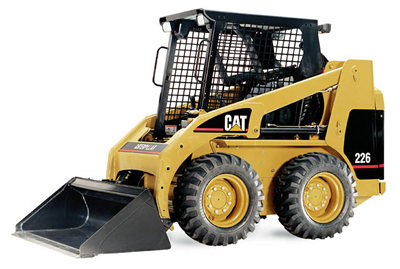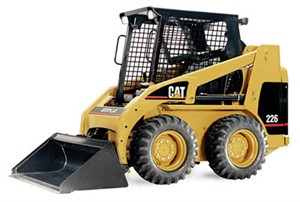Rent, Lease or Buy
by Jonathan McGaha | 27 July 2016 12:00 am

Taking the right approach to managing your equipment can also help you manage your finances and grow your company
 When I worked as a carpenter for a small residential construction company in the 1980s, the crew was surprised the day the owner purchased a used backhoe. Our company primarily did historic restoration, remodeling and custom homes. There wasn’t a lot of use for a backhoe. It was a toy. What we really could have used was another generator and a better compressor. The project supervisor said, sardonically, “If his mother had bought him a train set when he was a kid, maybe he wouldn’t have bought the backhoe.”
When I worked as a carpenter for a small residential construction company in the 1980s, the crew was surprised the day the owner purchased a used backhoe. Our company primarily did historic restoration, remodeling and custom homes. There wasn’t a lot of use for a backhoe. It was a toy. What we really could have used was another generator and a better compressor. The project supervisor said, sardonically, “If his mother had bought him a train set when he was a kid, maybe he wouldn’t have bought the backhoe.”
There is a power to owning something. It becomes yours and you can rely on it being ready when you want it. The convenience is a powerful draw.
However, for a small business owner, especially a contractor, that lure to own a piece of equipment may be bad for the bottom line. When I ran my own company, I adopted the attitude that I wanted to own as little as possible. I craved flexibility. In many ways, I probably went too far with that and hurt my company.
Somewhere in the middle lies the right strategy, and that strategy will vary depending on the contractor, growth stage of the company, type of work and type of equipment. Here’s what I learned from going through this process (and working with an accountant) that I think will be valuable to our readers.
Groundwork
Before you begin even evaluating whether to buy, lease or rent a piece of equipment you need to take a careful look at your company. What does your balance sheet tell you? Do you have so many liabilities that in the short-term your assets wouldn’t cover them? This is usually expressed as the current ratio. A current ratio of 1.0 means you have the assets necessary to cover your current liabilities. Contractors generally aim for a current ratio of 2.0.
You also need to evaluate if you have the capital necessary to purchase a piece of equipment. Often, contractors are profitable but don’t have enough capital because of a cash-flow bind. If that’s the case, now is not the time to be purchasing equipment. It will only exacerbate the cash-flow issue and could push a company to becoming unprofitable.
If your financials are in good shape, and you have the capital available, you need to look into the future and determine whether you might need to borrow money in the near future. Financing an equipment purchase through an institution with which you have a history may make sense. But if you may need to go to that bank and ask for a loan in the next year, a leasing arrangement where the transaction won’t appear on your books as a liability is probably the better option.
The last piece of groundwork necessary is to do an honest accounting of the need for the equipment. This depends a lot, of course, on the type of work you do and the equipment needed. It could be a skid-steer loader, backhoe, panel lift or even just a new pickup truck. For ease of simplicity, let’s consider it a new truck.
- Is it a replacement? If so, how dire is the condition of the previous truck and do you really need to replace it?
- Is it an additional truck? This depends a lot on the prospects for the growth of your company. Every growth pattern has a tranche of investment at particular points as you jump to the next growth stage. If you are at such a point, you will be facing growing pains and cash flow could become tight. Make sure this investment isn’t the one that becomes the one putting you over the edge.
- How much will the truck be used? An investment that sits in the garage or parking lot half the time is more albatross than asset. Evaluate how much you’re currently using the equipment you have and determine that total need. Generally, a new piece of equipment should be used 60 to 70 percent of the time. Otherwise, it’s not a good acquisition.
Buy vs. Lease
After you have made the decision to obtain a new piece of equipment, you have to determine whether you should buy or lease it. The pros and cons on this decision are actually pretty straightforward.
Leasing Pros:
- You won’t have to pay for maintenance since the leasing company is responsible for repairs caused by normal wear and tear.
- Leased equipment turns over more quickly, so you can keep up with the latest technology. You don’t want to get stuck with outdated equipment that puts you at a competitive disadvantage, but neither do you want to be chasing the new gadget.
- You don’t need a big down payment so your upfront costs are considerably less.
- Leasing payments are predictable, allowing you to budget more easily.
- From a tax point of view, leasing is often 100 percent deductible.
Leasing Cons:
- Over time, leasing costs more than purchasing.
- Some leasing terms may outstrip the time when you need the equipment so you could end up paying for equipment you no longer need. Since you don’t own it, you can’t sell it.
- Leasing gives you no equity in the equipment.
- There can be gray areas in leasing agree – ments about maintenance. Nail down exactly what you will be responsible for so you don’t get in a disagreement over a repair and incur unexpected expenses.
Buying Pros:
- It’s yours. You own it. You can do whatever you want with it, including making alterations. Want a custom paint job on your truck to match your branding? No problem. Go ahead and short stack the mufflers. Nothing like chrome to brighten a day.
- Buying is actually much easier. No contracts. No agreements.
- You can get exactly what you want. Many leasing companies have limited options, so you may have to settle for a piece of equipment that doesn’t match your exact needs.
- Being able to sell it also means you can recoup some of your investment.
- The IRS allows for the depreciation of equipment. Check with your accountant because, like many IRS rules, there are specific criteria and you want to make sure you’re meeting the requirements before you commit. You also can deduct insurance, taxes and interest.
Buying Cons:
- Going in, your bank account is going to take a hit because the upfront costs are higher. Because of that, you may have to settle for lower cost equipment.
- Technology changes rapidly, especially in an office environment. Ending up with out-of-date equipment can reduce your efficiency and hurt your company.
- Maintenance, maintenance, maintenance. It’s your burden and your cost. The cost extends beyond just the obvious elements of paying for it. It also includes the increased need to manage the equipment. Many contractors without strong equipment management procedures find that an expensive tool or piece of equipment can unexpectedly become a rusted hulk because no one was accountable for its maintenance.
Renting
For companies just starting out or for smaller companies, the best option may be to rent your equipment. It preserves your capital, which you’re plowing back into the company to help it grow or just plain don’t have. Renting also gives you more flexibility.
Rental agreements provide many of the same benefits of leasing, but with a few significant differences. First, the terms are more flexible. When you’re done using the equipment, you return it, so you’re only paying for equipment that is being used.
Like leases, rental agreements include maintenance provisions, which will allow you to control costs on repairs. Finally, if you don’t like the equipment, if it isn’t working for what you need, you just return it and rent what will work.
Source URL: https://www.metalconstructionnews.com/articles/rent-lease-or-buy/